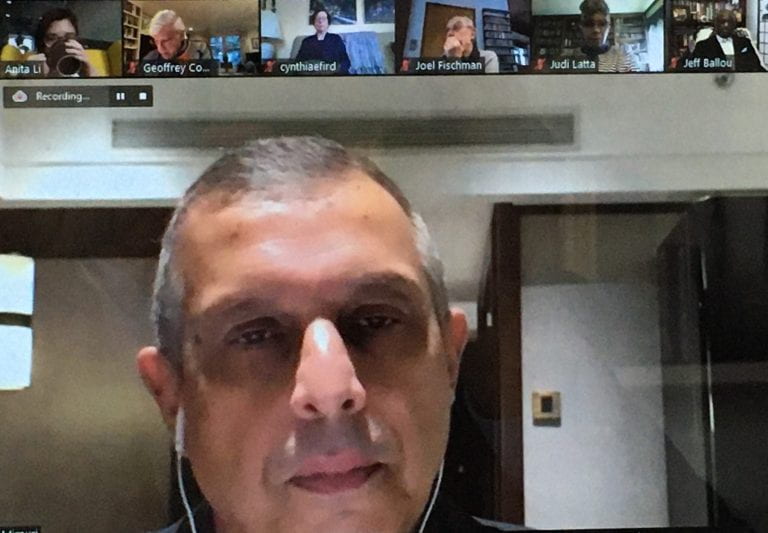By Joe B. Johnson, originally published by the Public Diplomacy Council.
The USC Annenberg Center on Communication Leadership and Policy sponsored a “global conversation on how the US election is being explained to the world” on December 15 — the day after the United States’ Electoral College voted Joseph Biden as President-elect.
Prof. Adam Clayton Powell III, chaired an eclectic panel of media experts from locations spanning all 24 time zones via Zoom. The Hon. Ashok Mirpuri, Singapore’s Ambassador to Washington, gave opening remarks from Singapore. The other panelists were:
- Jeff Ballou, News Editor for the Americas at Al Jazeera Media Network,
- Jacqueline Charles, Caribbean/Haiti Correspondent, Miami Herald
- Vasily Gatov, Russian Media Researcher and Author
- Anton Harber, co-founder of South Africa’s anti-apartheid Weekly Mail newspaper, now Caxton Professor of Journalism at the University of the Witwatersrand, Johannesburg
- Insun Kang, Deputy Managing Editor, The Chosun Ilbo, and former Washington bureau chief, Chosun Media
- Anita Li, who teaches at Centennial College in Toronto and the City University of New York.
For me, the single thread of conversation throughout is obvious and also worth repeating: world leaders and their publics judge our election experience through the filter of their own interests. For many, the United States is also a mirror that reflects their own problems and anxieties.
Speaking from Singapore, where he is quarantining after traveling home for the holidays, Amb. Mirpuri emphasized the challenging questions posed by Republicans’ refusal to accept Biden’s victory in the popular and Electoral College votes. He noted Singapore’s dependence on global trade; the city-state will host the Davos economic conference this May. In fact, Mirpuri asserted, “Putin got it right” when the Russian leader waited for the Electoral College before congratulating Biden and Harris. Singapore, he said, is anxious for a renewed effort to update multilateral institutions like the United Nations Security Council and UN agencies, and to encourage or rejoin multilateral trade arrangements like the Trans-Pacific Partnership.
Kang reported that Koreans watch our Presidential campaign “like a sports game.” But this election exposed systems and rules they never saw before, like the Electoral College. They now look expectantly toward Biden’s moves on military burden-sharing and North Korea. Responding to a question about the North, Kang noted its radio silence since November 3 as the leadership considers its first move with the new Administration: more nuclear testing, or a gesture of conciliation?
Harber spoke of challenges to freedom of expression over the past four years, saying journalists feel “vulnerable and uncertain” – on the back foot in their “struggles to defend open societies” around the world.

Ballou echoed that sentiment, but then he listed Al Jazeera’s top stories in August 2019: Yemen, the Ebola virus, and U.S. sanctions on Iran. Elections will not always be the top story. “Everything is a matter of perspective,” he observed.
For Gatov, U.S. elections were a “filter bubble” for Russian writers, often measured against Russian elections. He described a fractious array of Russian media, some strongly pro-Trump and others more neutral. A prominent narrative paints the U.S. as a “falling giant” that leaves a free hand to President Putin to interfere in other nations. Now that Putin has recognized the President-elect, however, pundits are beginning to examine the prospects working with the new Administration.
Charles, who reports from Miami, says Caribbean leaders evaluate U.S. politics “according to their own selfish reasons.” Policy toward Venezuela has dominated both official policy and coverage in Haiti, Jamaica and elsewhere. In Haiti, she said, people have jokingly asked, “Who is going to call in the UN to settle this vote?” Biden can restore relations by choosing the right Assistant Secretary of State for the Western Hemisphere, Charles concluded.
Saying “Canadian public opinion on America is at an all-time low,” Li noted that CNN garnered more Canadian viewers on election night than the top two Canadian broadcasters combined. She said Canadians, who see themselves as “morally superior” to Americans, are nevertheless looking ahead warily to see “how people go about correcting the damage that has been done.” Later, responding to a question, Li noted that after the Black Lives Matter protests, Canadians are beginning to examine their own attitudes toward race.
Kamala Harris, the first female of color to become Vice-President, prompted less reflection among this group than I would have predicted. Harber said Harris “resonated with many people [in South Africa]” but the horse race was the overwhelming story. Gatov pointed to local media replay of right-wing U.S. media tropes about Harris. He referred a “racist, anti-feminist” Russian establishment. Now, the coverage of Harris is softening, he added.
Anton, Gatov and Li all viewed the Trump Administration’s attacks on the press and its “fake news” mantra as a personal challenge to them as media representatives. Gatov went further, indicating that a strong gesture on behalf of freedom of expression could win popular support in Russia. “Press freedom is an important thing for Russian society, where there are few independent voices,” he said. Specifically, he recommended that Biden should “retune” the U.S. Agency for Global Media to restate respect for fact-based, independent journalism.
While Ballou pointed out the Obama Administration’s conflicts with the news media, both he and Kang expressed the view that by merely returning to standard practices like regular briefings and coordinated release of vetted official information (instead of Twitter posts), the Biden Administration would go a long way toward restoring media relations and respect for freedom of the press.
Here’s the deal, as the President-elect likes to say. The Biden Administration inherits a nation that is no longer the beacon of democracy that it was. But the world continues to watch, and our harrowing electoral experience offers examples of resilience, the rule of law and loyalty to democratic norms at the local level. That’s a story that can open conversations with the rest of the world.
